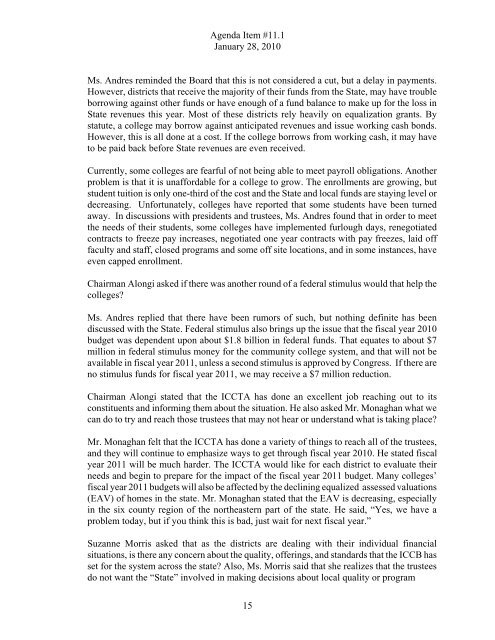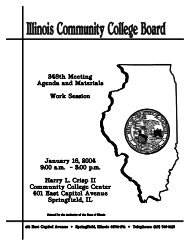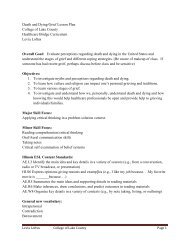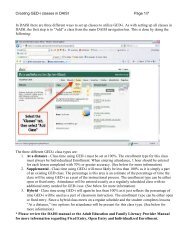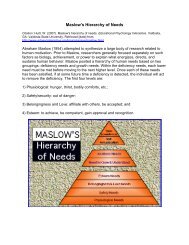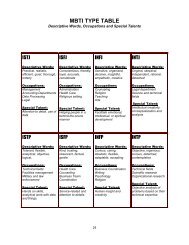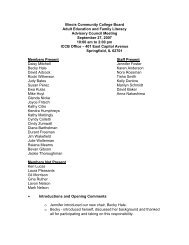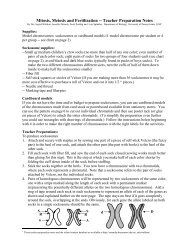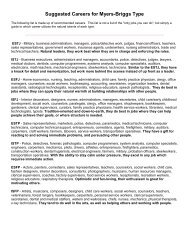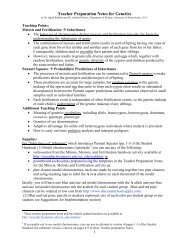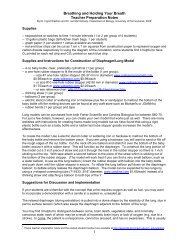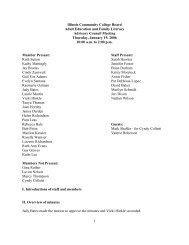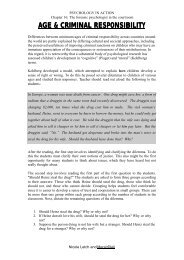Revised - Illinois Community College Board
Revised - Illinois Community College Board
Revised - Illinois Community College Board
Create successful ePaper yourself
Turn your PDF publications into a flip-book with our unique Google optimized e-Paper software.
Agenda Item #11.1<br />
January 28, 2010<br />
Ms. Andres reminded the <strong>Board</strong> that this is not considered a cut, but a delay in payments.<br />
However, districts that receive the majority of their funds from the State, may have trouble<br />
borrowing against other funds or have enough of a fund balance to make up for the loss in<br />
State revenues this year. Most of these districts rely heavily on equalization grants. By<br />
statute, a college may borrow against anticipated revenues and issue working cash bonds.<br />
However, this is all done at a cost. If the college borrows from working cash, it may have<br />
to be paid back before State revenues are even received.<br />
Currently, some colleges are fearful of not being able to meet payroll obligations. Another<br />
problem is that it is unaffordable for a college to grow. The enrollments are growing, but<br />
student tuition is only one-third of the cost and the State and local funds are staying level or<br />
decreasing. Unfortunately, colleges have reported that some students have been turned<br />
away. In discussions with presidents and trustees, Ms. Andres found that in order to meet<br />
the needs of their students, some colleges have implemented furlough days, renegotiated<br />
contracts to freeze pay increases, negotiated one year contracts with pay freezes, laid off<br />
faculty and staff, closed programs and some off site locations, and in some instances, have<br />
even capped enrollment.<br />
Chairman Alongi asked if there was another round of a federal stimulus would that help the<br />
colleges?<br />
Ms. Andres replied that there have been rumors of such, but nothing definite has been<br />
discussed with the State. Federal stimulus also brings up the issue that the fiscal year 2010<br />
budget was dependent upon about $1.8 billion in federal funds. That equates to about $7<br />
million in federal stimulus money for the community college system, and that will not be<br />
available in fiscal year 2011, unless a second stimulus is approved by Congress. If there are<br />
no stimulus funds for fiscal year 2011, we may receive a $7 million reduction.<br />
Chairman Alongi stated that the ICCTA has done an excellent job reaching out to its<br />
constituents and informing them about the situation. He also asked Mr. Monaghan what we<br />
can do to try and reach those trustees that may not hear or understand what is taking place?<br />
Mr. Monaghan felt that the ICCTA has done a variety of things to reach all of the trustees,<br />
and they will continue to emphasize ways to get through fiscal year 2010. He stated fiscal<br />
year 2011 will be much harder. The ICCTA would like for each district to evaluate their<br />
needs and begin to prepare for the impact of the fiscal year 2011 budget. Many colleges’<br />
fiscal year 2011 budgets will also be affected by the declining equalized assessed valuations<br />
(EAV) of homes in the state. Mr. Monaghan stated that the EAV is decreasing, especially<br />
in the six county region of the northeastern part of the state. He said, “Yes, we have a<br />
problem today, but if you think this is bad, just wait for next fiscal year.”<br />
Suzanne Morris asked that as the districts are dealing with their individual financial<br />
situations, is there any concern about the quality, offerings, and standards that the ICCB has<br />
set for the system across the state? Also, Ms. Morris said that she realizes that the trustees<br />
do not want the “State” involved in making decisions about local quality or program<br />
15


